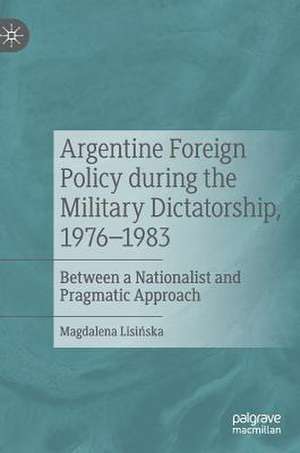Argentine Foreign Policy during the Military Dictatorship, 1976–1983: Between a Nationalist and Pragmatic Approach
Autor Magdalena Lisińskaen Limba Engleză Hardback – 21 ian 2019
Preț: 500.59 lei
Preț vechi: 588.92 lei
-15% Nou
Puncte Express: 751
Preț estimativ în valută:
95.79€ • 100.47$ • 79.74£
95.79€ • 100.47$ • 79.74£
Carte tipărită la comandă
Livrare economică 01-15 aprilie
Preluare comenzi: 021 569.72.76
Specificații
ISBN-13: 9783030062149
ISBN-10: 3030062147
Pagini: 185
Ilustrații: XV, 197 p. 9 illus.
Dimensiuni: 148 x 210 mm
Greutate: 0.45 kg
Ediția:1st ed. 2019
Editura: Springer International Publishing
Colecția Palgrave Macmillan
Locul publicării:Cham, Switzerland
ISBN-10: 3030062147
Pagini: 185
Ilustrații: XV, 197 p. 9 illus.
Dimensiuni: 148 x 210 mm
Greutate: 0.45 kg
Ediția:1st ed. 2019
Editura: Springer International Publishing
Colecția Palgrave Macmillan
Locul publicării:Cham, Switzerland
Cuprins
1. Introduction.- 2. Ideological identification of the Argentine Armed Forces under the Military Rule.- 3. Mechanisms and determinants of Argentine Foreign Policy under the Military Rule.- 4. Diplomacy on the Multilateral Level: Human Rights and the Atomic Program.- 5. The Beagle Channel Territorial Dispute with Chile.- 6. Covert Military Operations: The Case of Central America.- 7. The Falklands Dispute and the Argentine-British War.- 8. Final Remarks: Ideologization of Argentine Foreign Policy under the Military Rule.
Notă biografică
Magdalena Lisińska is Assistant Lecturer at the Institute of Political Science and International Relations of the Jagiellonian University in Poland. Her research focuses on Argentine politics and history, United States–Latin American relations, and security challenges in Latin America.
Textul de pe ultima copertă
This book examines Argentine foreign policy under the military dictatorship from 1976–1973, also known as the National Reorganization Process. It brings together case studies on the most distinctive decisions and key issues in the regime’s foreign relations, including the international response to human rights violations, the dispute with Chile over the Beagle Channel, covert operations in Central America, the Argentine nuclear program, and the Falklands War. Lisińska examines the influence of ideological factors on foreign policy decisions, highlighting the relationship between the nationalism shaping the military’s policy goals and its pragmatic approach to achieving them.
Caracteristici
Offers the first comprehensive study of foreign policy in Argentina during the 1976–1983 military dictatorship Focuses on the role of ideology in foreign policy decision-making Appeals to scholars of international relations, Latin American history, and Latin American politics
